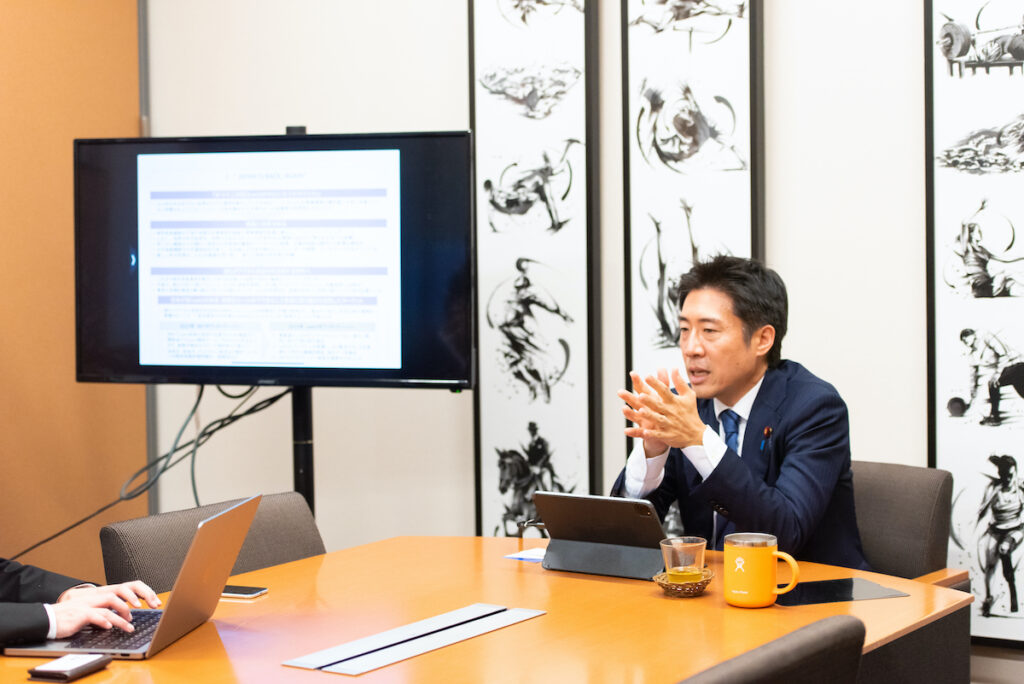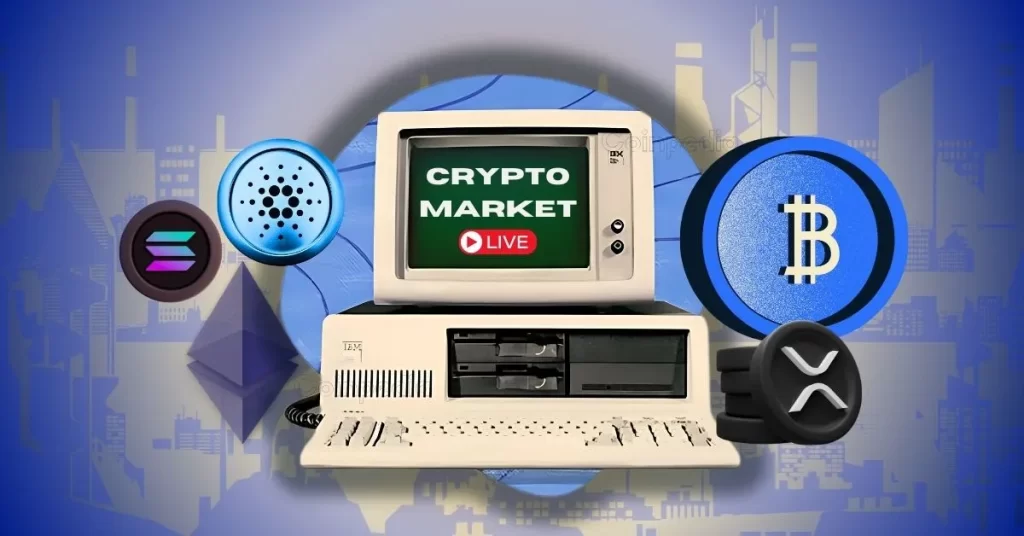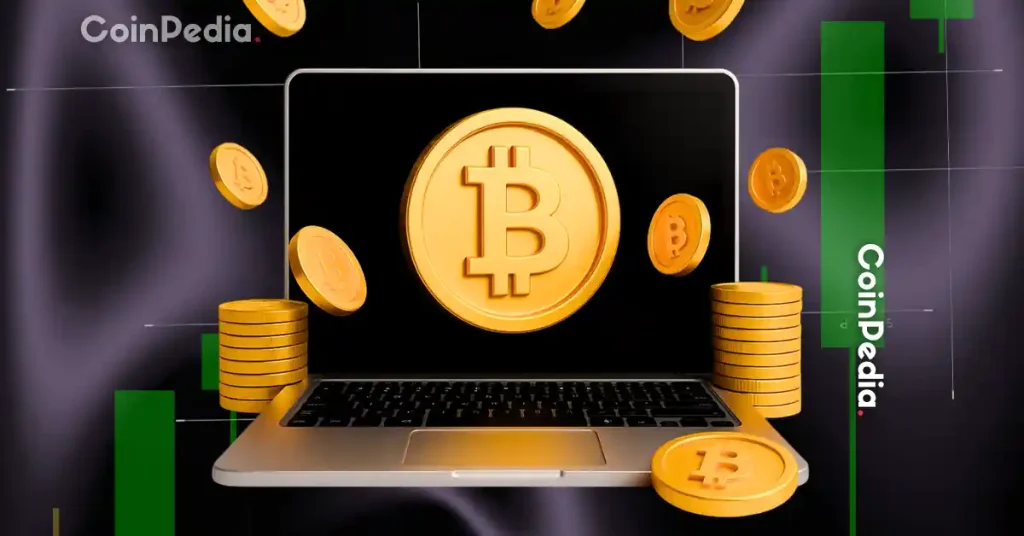
On April 6, the web3 project team of the Liberal Democratic Party’s Digital Society Promotion Headquarters released the “web3 white paper-towards an era in which everyone can utilize digital assets-“. As a PT, this is a proposal following the “NFT White Paper” in March last year and the “interim proposal” in December, and is based on the timing that the Basic Policy 2023 will be finalized in June.
CoindeskJAPAN interviewed Akihisa Shiozaki, the secretary general of the web3 project team, about the purpose of the white paper and the thoughts behind it.
The Meaning of “JAPAN IS BACK” and “Knowing Keigusa in a Gale”
In this web3 white paper, the key words are “JAPAN IS BACK, AGAIN”. Last year, when I was discussing this at NFTPT (of the digital committee), a young web3 entrepreneur said, “Japan used to be the center of web3, but in the blink of an eye, it fell away and was no longer seen. The starting point was when I was told that I was in danger.
However, crypto winter (winter of crypto assets) came from there, and as tokens and crypto asset exchange FTX went bankrupt, there was talk that “in the end, Japan’s regulations were correct?” It’s here. Japanese entrepreneurs did not suffer as much. At a time when supplies and ammunition are running out overseas, Japan still has the stamina to do it properly.
In addition, major players in Japan who had not yet entered the market have started to enter at this time. There are moves such as NTT Docomo investing 600 billion yen, major financial institutions starting stablecoins, and JR issuing NFTs. Local governments are also increasingly issuing NFTs. With the arrival of people who weren’t in the traditional “Crypt Village”, I feel a different trend.
In the white paper, there is a phrase, “Knowing the strength of the wind. Meaningful.
Until now, the cryptocurrency industry has been driven by early adopters, but from now on, it will shift to mass adoption (spreading to many people). Everyone will have wallets and digital assets as a matter of course, and Bitcoin, NFTs, and security tokens will become “normal” rather than special. Such a world is beginning to materialize in front of our eyes.
From now on, rather than things such as “we can do anything because the regulations are lax” or “we can make money because the taxes are low”, “being a mature market with clear rules” will become more attractive. .
This web3 white paper was created based on such a bird’s-eye view. A year ago and now, the page of the times has clearly changed. “When the crypto winter ends, Japan may be the first to welcome spring.” I would like to send such a message to Japanese entrepreneurs.
Wide range of proposals
The contents are wide-ranging, but to explain the short-term points, the first is the establishment of international rules.
As a major trend, overseas countries are moving towards tightening regulations. Of course, proper regulation is necessary. However, some people take the stance that “crypto assets should be destroyed because they are outrageous.”
Now is also a great opportunity for Japan to demonstrate its superiority. Looking to the future, we propose that we should clarify our position to lead responsible innovation in a technology-neutral manner.
He also made several proposals for tax reform. The biggest point is the “taxation issue regarding owned tokens issued by other companies” that remained after last year’s tax reform. A policy was announced to exclude self-issued tokens from the period-end mark-to-market valuation taxation, but other companies’ tokens still remain. Here, we are making a step-by-step proposal that “it should be realized this year.”
Regarding the DAO, there is a problem that “there is no legal entity/union form suitable for the flexible establishment and operation of the DAO.” It also aims to enact legislation as soon as possible, and says that lawmakers’ legislation should also be considered. In the proposal, a LLC-type DAO special law is enacted based on limited liability companies, and the provisions of the Companies Act and the Financial Instruments and Exchange Act are partially changed and applied. If realized, it would be the first time in the world.
He suggested that the examination of tokens should be made more concrete and visible. There are also issues with disclosing reserved conditions during token screening, and even if JVCEA understands the risks of tokens, if that information remains undisclosed, it will ultimately not lead to consumer protection.
As for security tokens, the problem is that the secondary market is not well-established and there are not many transactions. Therefore, he recommends that the Japan Securities Dealers Association and the STO Association should promote initiatives such as the formulation of self-regulatory rules for smooth trading on PTS (private trading systems).
It also makes recommendations on the fake “unlicensed NFT problem”. This is a theme that prevents infringement of rights to Japanese content and also leads to consumer protection. When the Ministry of Economy, Trade and Industry requests it, there are also overseas platforms that properly handle deletions. Recommendations should continue to encourage such efforts and the recording of content rights information by industry groups.
As for financial institutions, the entry of big players into web3 is progressing. However, when banks and insurance companies enter the web3 domain, there is a problem that the scope of the company’s approval examination, such as the applicable system for legally ancillary business and sophistication, is unclear. In the proposal, we should continue to accelerate the review process, clarify the guidelines, and publish them in a timely manner.
Regarding the NFT business, I have made many proposals. One of the points is the question of whether fantasy sports using NFTs fall under gambling. Here we should make a solid guideline and draw the line properly to what is good and what is not good.
He also touched on the diversification of investment vehicles and schemes. In order to solve the problem that investment business limited partnerships (LPS) cannot invest in businesses that acquire and hold crypto assets and tokens, the Ministry of Economy, Trade and Industry and the Financial Services Agency conducted a fact-finding survey and found that crypto asset exchange business Gender should be sorted out.
Medium-term issues
The “middle-range” issue, which looks a little farther, should start and deepen discussions with an eye toward development.
For example, the handling of digital assets under private law is unclear, and problems have been pointed out in terms of rights transfer and perfection requirements. With regard to these points, he suggested that issues should be sorted out by following international trends.
In addition, industry support for overseas expansion of content using web3, arrangement of licenses for diversifying web3 businesses, consumer protection, wallets, anti-money laundering and anti-terrorism measures, local government support and investment DAO It also covers rules.
It also touches on the progress of measures taken up in last year’s NFT white paper. This is meant to send the message that you are paying close attention, rather than just leaving it at that. We plan to regularly check the progress of this web3 white paper.
In this way, policies range from large to small, so it may be difficult to grasp the overall picture if you look at them separately. But the overall narrative is that Japan has a very strong tailwind.
The landscape surrounding crypto assets is changing at a dizzying pace, so it’s unclear how long this tailwind will last. Still, now is the time to compete for mass adoption. I would like you to feel such a message as a bass continuo behind various proposals.
Transformation behind the scenes

web3PT has already held 18 meetings since last October. Partly because it is held every week, the members take pride in the fact that, as politicians, they hear more talks in this field than anyone else.
The “new policy-making process” that was started during the NFTPT is also showing results. This is a system in which politicians, bureaucrats, and experts form teams and invite experts and bureaucrats to participate in all meetings to deepen discussions and bring them to the point of writing policy recommendations.
In the past, it would have been common for bureaucrats to “transcribe” what they heard from politicians, modify the wording slightly, and summarize it in a proposal. Of course, there are times when things go well with that, but things are different in the world of web3, where things change quickly and develop in various fields.
This is because, in many cases, government offices do not have sufficient knowledge at the beginning of discussions, and there are many cases in which the ministries and agencies in charge are diverse. In such fields, discussions will not proceed unless strong political initiatives are taken.
Therefore, we have adopted a method in which politicians (parliamentarians) and experts (lawyers) first create a draft and then submit it to the government office. After having a wide range of heated discussions with government offices, such as whether there are factual errors and feasibility, the sentences are finally summarized. It is a style that can get the power of more people by the time it is settled into a draft.
We were able to adopt this method because Chairman Taira (Masaaki Taira, member of the House of Representatives, chairman of the web3 project team of the Liberal Democratic Party Digital Society Promotion Headquarters) showed the general direction and demonstrated leadership in the direction of entrusting detailed operation methods. Because you are doing it.
The existence of eight lawyers who are cooperating as experts is also important. They are also actively working on writing policy proposals, which is a bit different from their usual work.
As a lawyer, I receive legal advice from people on the front line of business, and every day I am accumulating ideas such as “Isn’t this rule strange?” If there is a sense of urgency in her proposals this time, it is probably because, with the cooperation of experts, she was able to reflect the legal issues of cutting-edge practices that are not written in any book. In order to create good policies, I think it is necessary to combine the knowledge of experts from cutting-edge practices with the broad perspectives of politicians.
The members of the PT, who are Diet members, also have specialized knowledge in areas such as finance and technology, and are willing to take on new challenges. If VR or Metaverse become a topic, try using wearable goggles, or if NFT becomes a topic, try making a wallet.
I also used “Metamask” and “Opensea” to trade NFTs and made the Twitter icon an NFT. I had the painful experience of losing my Ethereum (ETH) after being caught by a fake account, but I believe that such an experience is also important for writing good policy proposals. This is because there are many things that you will not know until you actually try.
Timing of “Mass Adoption”
Personally, I have a strong feeling that Japan should promote innovation even if it takes risks. I studied abroad at Stanford in 1999-2000, where I was exposed to the frontline waves of the Internet changing the world. How to incorporate the power of innovation into society will be a major political theme in the future.
As digital assets are combined with existing infrastructure, there is a possibility that they will spread all at once in the future. The entry of big players is also significant, and there are many cases where even if the movement seems slow at first glance, it is a very large-scale concept.
As we continued to disseminate information through white papers and proposals, we began to receive cutting-edge information. In the future, many solutions will emerge to improve the usability of digital assets. Mass adoption may occur “surprisingly” early.
|Interview text: Kazuki Watanabe
|Editing: Coindesk JAPAN Editorial Department
|Photo: Airi Okonogi
The post What is the aim of the Liberal Democratic Party’s “web3 white paper”? ── Interview with PT Secretary Akihisa Shiozaki | coindesk JAPAN appeared first on Our Bitcoin News.

 2 years ago
139
2 years ago
139














 English (US) ·
English (US) ·